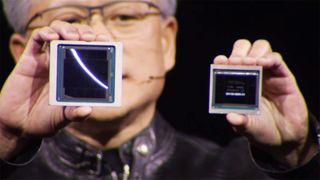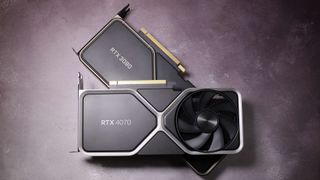
Although Nvidia's Blackwell chips are finally starting to line server racks—for example, Microsoft Azure servers—they're still arriving a little later than initially planned. But perhaps they should have arrived even later, as we're now hearing word that the chips might have been rushed to market too soon.
Tech site The Information (via Business Korea) reports that "during testing of the Blackwell chips in the weeks after Huang's announcement, Nvidia engineers discovered that the chips failed in the types of high-voltage environments that are common in data centers". This is supposedly according to "two people with direct knowledge of the problem".
The two sides are apparently blaming each other for this, with TSMC saying Nvidia rushed production and Nvidia saying the defects are due to TSMC's packaging tech. Whoever's to blame, the result seems to be tension in a three decade-long relationship between the two companies.
Which isn't to say there's been 30 years of uninterrupted partnership. Perhaps most prominently, the relationship was punctuated by an intermission for Nvidia's 30-series 'Ampere' GPUs, which it had Samsung produce. Now, The Information suggests that Nvidia could ditch TSMC for Samsung once again and hopes to receive a 20–30% discount compared to TSMC.
Yeah, and I hope for a 20–30% tax break. What, wishes aren't fishes?
I don't buy it. The fact is, TSMC is the only real game in town right now for Nvidia. It has more advanced process nodes and it doesn't have to reserve any of its fabrication for its own chips because it produces solely for third parties.
Plus, Nvidia's unlikely to have forgotten that the last time it partnered with Samsung, things didn't turn out so well, with skyrocketing prices and GPU shortages. Yes, unfortunate world events led to this, but the results were what they were and, unfortunately for Samsung, nothing can be done about that now.
The biggest gaming news, reviews and hardware deals
Keep up to date with the most important stories and the best deals, as picked by the PC Gamer team.

Best CPU for gaming: The top chips from Intel and AMD.
Best gaming motherboard: The right boards.
Best graphics card: Your perfect pixel-pusher awaits.
Best SSD for gaming: Get into the game ahead of the rest.
Samsung's not been doing amazingly of late, with its stock prices falling and foreign investors selling shares in the company. However, it's not all doom and gloom, as the chip giant is still a giant. Along with TSMC, it's been eyeballing the Middle East for new fabs and is still planning on ploughing into 1.4 nm production.
But TSMC still remains a better choice, even if relations are strained right now due to chip defects. Hell, it's just booked a 39% increase in sales compared to Q3 last year. The market's really booming in TSMC's favour right now.
If all The Information reports is correct, what seems more likely is that Nvidia's angling for a better deal than it's currently getting.
Let's just hope these supposed defects don't make their way into the RTX 50-series batches that should launch early next year.

Jacob got his hands on a gaming PC for the first time when he was about 12 years old. He swiftly realised the local PC repair store had ripped him off with his build and vowed never to let another soul build his rig again. With this vow, Jacob the hardware junkie was born. Since then, Jacob's led a double-life as part-hardware geek, part-philosophy nerd, first working as a Hardware Writer for PCGamesN in 2020, then working towards a PhD in Philosophy for a few years (result pending a patiently awaited viva exam) while freelancing on the side for sites such as TechRadar, Pocket-lint, and yours truly, PC Gamer. Eventually, he gave up the ruthless mercenary life to join the world's #1 PC Gaming site full-time. It's definitely not an ego thing, he assures us.
Most Popular








